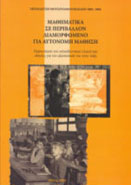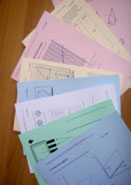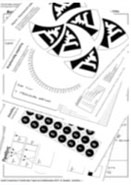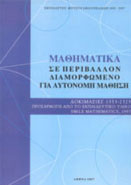



“Mathematics in an Environment Shaped for Autonomous Learning”
Goal: This alternative material, and the teaching approach proposed for its usage with minority children attending public secondary schools in Thrace, aim at contributing to their overcoming the difficulties they face in mathematics and to the improvement of their school performance.
Description
This is a collection of a variety of material for an alternative approach to the teaching of mathematics. It encourages the pupil’s autonomy, favours the use of a large quantity of data from the environment in which he/she lives, and provides substantial opportunities for induction into the mathematical knowledge and thought, which are seen as products of the human activity.
The material is mainly a translation of a British one, called SMILE (Secondary Mathematics Independent Learning Environment), into Greek and adapted to the Greek reality.
The basic goals of the material are:
- Enriching the official curriculum of mathematics with alternative activities of mainly an investigative nature.
- Supporting the autonomous development of the pupil’s mathematical knowledge.
This educational package, available in both hard copy and in electronic version includes:
- A pamphlet that introduces the material and provides directions for its use in the classroom.
- An activities map, which lists all the activities of this educational material, by level of difficulty and by thematic unit.
- A catalogue of activities, which also lists all the activities, but by their numbers and in ascending order.
- Activity “cards” (the activities offered by the material are categorized into eight levels of difficulty and are divided into 44 units, analogous to the ones of the official Analytical Program, or curriculum, of Mathematics),
- Answer sheets to the activities bound in volumes,
- Test sheets,
- Sheets with answers to the tests, and
- Homework sheets: These contain homework to be assigned to the pupil with a view to facilitate his/her carrying out of specific activities. They often pertain to the conduct of simple activities, such as a construction, a diagram or a map, in other words, activities that would enhance the development of intellectual and material tools of the pupil and help him/her come up with strategies for the effective exploration of the mathematical idea that is being studied.
- A sample of the activities chart of the pupil.
The educational materials for Mathematics have been approved by the Pedagogical Institute.





